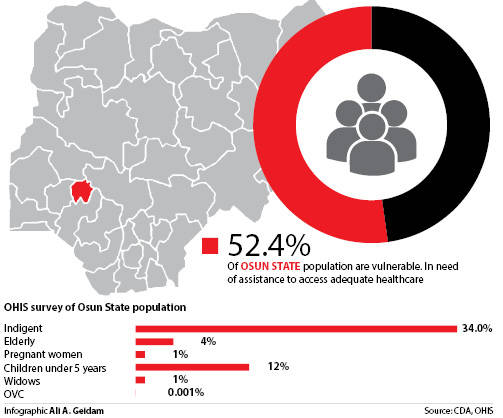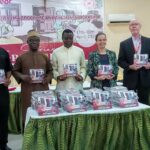
Hospitals are supposed to help sustain life but in Osun, our correspondent discovers that the hospitals are crippled and don’t seem to have the capacity to cater for the vulnerable population in the state.
A traditional chief in Imesi-Ile, a community in Obokun Local Government Area of Osun State was not feeling well and was taken to the nearby Primary Health Care Centre of the Obafemi Awolowo University Teaching Hospital Complex (OAUTHC).
The doctor on duty examined the old man and after his assessment, referred the patient to the OAUTHC Wesley Guild Hospital, Ilesa. Fuming, relatives of the chief ushered him out of the health centre in utter disappointment. A resident of the community lamented that the facility, built to provide primary healthcare services for people in the community, was handicapped to do so effectively.
The sprawling facility occupying a large expanse of land in a serene environment in Imesi-Ile was the best of its kind when it was functioning at full steam several decades ago. But when our correspondent visited recently, the facility has become a shadow of its former self.
The doctor who had examined the chief sat in one of the consulting rooms reading a book, in one of the rooms, a nurse attended to a young patient and in the premises, an ambulance stood unattended. The other wards were locked up.
A community leader in Imesi-Ile, Kayode Omole said the facility was operating at its lowest capacity. But things hadn’t always been like that.
“This facility was providing quality medical services to us in the community in the past. In fact, some of the doctors posted to work here were white men and they performed their duties with dedication. They lived here with us. They offered the treatment to the people free of charge. And we were very happy. But things have changed since the white men left. We want government to take necessary steps to restore the glory of this health facility,” he said.
Mr Tunde Sanmi, another resident echoed this sentiment. “The OAUTHC is posting doctors and nurses to this hospital but they can only do very little work. Whenever our people come to this facility to seek medical treatment, after a brief check, the doctor will just refer the person to Wesley Guild Hospital in Ilesa or elsewhere. That person will just go back home and resort to some herbs because they could not afford the cost of the treatment in the hospital that they were referred to in the city,” he said.
This situation is not peculiar to Imesi-Ile. There are government primary healthcare facilities across the state, but they can only handle minor cases. Most of the patients cannot afford the fees of the hospitals they are being referred to.
This has cost many lives already, according to Mr Michael Ogunyemi, a resident of Osobgo, the state capital.
“We have primary healthcare centres and they are functioning though not at full capacity. They could only attend to things like headache and probably malaria. But if the case of the patient is serious, they would refer such persons to the Ladoke Akintola University Teaching Hospital or Obafemi Awolowo University Teaching Hospital in Ile-Ife or sometimes, it could be University College Hospital in Ibadan, Oyo State. I’m aware that most of the people that were referred would not even go to the hospital. Where are they going to get the money! Some people may not even have transportation fare to go back home from the health centre. Some may be lucky to survive it miraculously but majority of such people die. Something must be done to address this situation.”
But this view is not shared by the Director of Administration, OAUTHC, Mrs Bola Alejo. She insists the facility in Imesi-Ile is functioning well and is well staffed. She noted that people in the community access treatment in the facility while others prefer to seek treatment elsewhere. She declined further comments.
Meanwhile, a recent Core Diagnostics for Action (CDA) conducted by United States Agency for International Development’s Health Finance Governance (USAID-HFG) project indicated that at least 52.4 percent of the population of Osun State are vulnerable and therefore in need of assistance to access adequate healthcare, such as the one the primary healthcare facilities should provide.
The Executive Secretary of Osun Health Insurance Scheme (OHIS), Dr Niyi Oginni said that from the survey, “34.0 of Osun’s population are indigent people, four percent are elderly, one percent are pregnant women, 12 percent are children under five years, one percent are widows and 0.001 percent are Orphans and Vulnerable Children (OVC).”
Oginni noted that the introduction of the social insurance scheme in the state by the state government became very imperative given the huge population of vulnerable people in the state.
He believes that when the scheme becomes fully operational, it would cater to this demographic.
The Chief of Party of USAID-HFG project, Dr Gafar Alawode said that the health insurance scheme is a necessary mechanism to achieve the Universal Health Coverage that could help people access better healthcare.
“We have to pull resources together through health insurance so that those that are rich and wealthy can contribute to help those that are sick. Those that are healthy must also enrol in health insurance so that there would be money to cater for those that are sick. If we have a large pool, there would be enough to treat those that are sick,” he said.
The universal health coverage might not be achieved without quality and comprehensive primary healthcare services and without UHC, attainment of Sustainable Development Goals agenda in the country would be an illusion.
For the ailing chief in Imesi-Ile, all this schemes and proclamations would only make sense if he and his people can access basic healthcare with minimal fuss. But for now, that dream remains farfetched.




